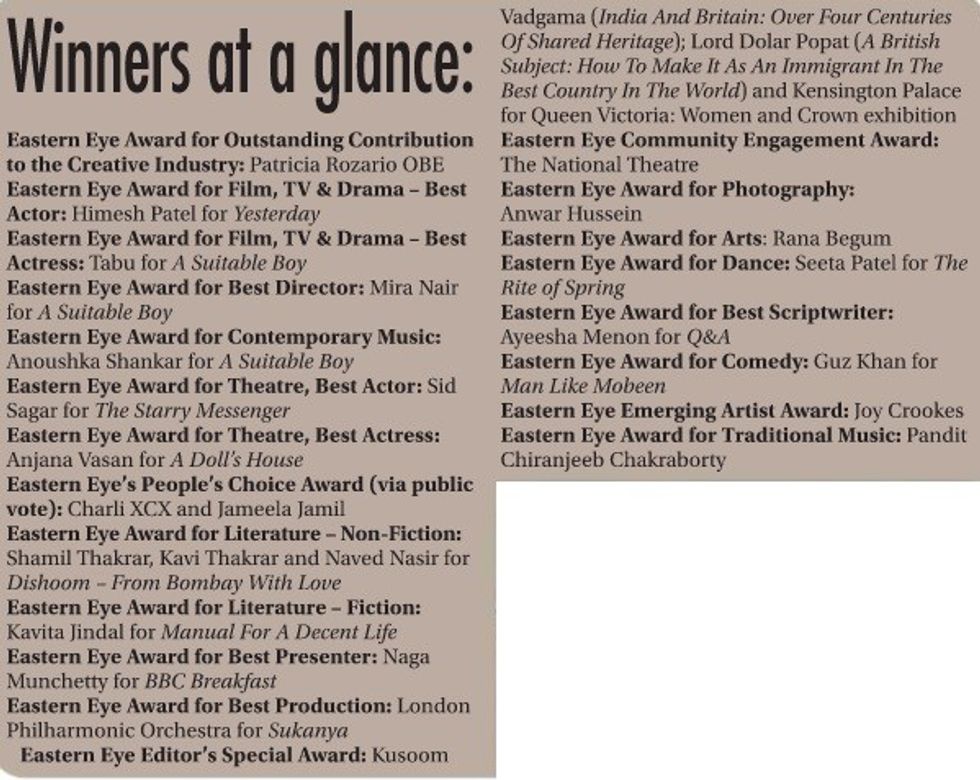THE BBC drama, A Suitable Boy, was the big winner at last week’s Eastern Eye Arts, Culture and Theatre Awards (ACTA), which celebrate the best of Asian talent in the creative industries.
The primetime TV series, based on Vikram Seth’s novel of the same name, won three awards – Best Director (Mira Nair); Best Actress (Tabu) and Best Contemporary Music (Anoushka Shankar).
Now in their fifth year, the ACTAs are hosted by the Asian Media Group (AMG), publishers of Eastern Eye and Garavi Gujarat news weeklies. Coronavirus restrictions meant the awards ceremony last Wednesday (17) was held virtually, with BBC presenter Nihal Arthanayake as the host. Prominent personalities from the arts, entertainment and media worlds joined a global audience for the event.

Caroline Dinenage, the minister for digital and culture at the Department for Digital, Culture, Media and Sport, said, “I’m delighted to see these awards highlight the enormous contribution of British Asian talent to this work and the creative industries generally, and am hugely supportive of the work being done to foster diversity in the sector.”
Noting the impact of the pandemic on the arts, London mayor Sadiq Khan said, “It has been an immensely difficult year for our world-class cultural sector which has seen its lifeblood – in-person performances, exhibits and events – drained away.
“As creatives, you have been through so much, yet your ability to surprise, delight, educate and entertain endures. Whether by watching a film or TV programme or listening to music or podcasts on our daily walks, your talent and creativity has helped keep us going.”
In a message, AMG’s group managing editor, Kalpesh Solanki, and executive editor Shailesh Solanki, said, “The ACTAs are part of a rich national conversation we must contribute towards and build upon, as the performing arts continue to recover through this year.
“We aim to recognise the sector’s resilience and courage in moving forward and continuing to tell important stories.”
There were 24 winners in all, in categories spanning literature, cinema and music, among others.
Opera star Patricia Rozario OBE won the Eastern Eye Award for Outstanding Contribution to the Creative Industry.
Rozario, who trained at the Guildhall of Music in London and has been a singer for more than four decades, also teaches at the Royal College of Music. Through her vocal institute in India, six students have established careers in the country.
British Indian actor Himesh Patel was adjudged Best Actor (in the film, TV and drama category) for his role in Yesterday.
Actress Anjana Vasan won the Best Actress (theatre) award for her portrayal in a new adaptation of the classic Ibsen play, A Doll’s House, at the Lyric Hammersmith, while the Best Actor gong went to Sid Sagar for his performance in the West End play, A Starry Messenger.
Musician Charli XCX and actress Jameela Jamil were joint winners of Eastern Eye’s People’s Choice Award (which was voted for by the public).
There were three winners of the Editor’s Special Award – author Kusoom Vadgama for her work, India and Britain: Over Four Centuries of Shared Heritage; Lord Dolar Popat for his book, A British Subject: How to make it as an immigrant in the best country in the world and Kensington Palace for the Queen Victoria: Women and Crown exhibition.
Amit Roy, Eastern Eye’s editor at large and chairman of the ACTAs judging panel, said, “We need our writers to tell their heroic stories. We have also seen that television is ready for stories with Asian themes – from A Suitable Boy to the Charles Sobhraj drama, The Serpent.”
Among other winners were restaurant owners Shamil Thakrar, Kavi Thakrar and chef Naved Nasir, who bagged the Eastern Eye Award for Literature (non-fiction) for Dishoom – From Bombay With Love. The cookbook was praised for being part history, part memoir, and a “labour of love to the great cosmopolitan city that is Mumbai”.
Kavita Jindal won the Eastern Eye Award for Literature (fiction) for the novel, Manual for a Decent Life, which explores a woman’s journey to becoming a member of parliament.
Popular TV host Naga Munchetty received the Eastern Eye Award for Best Presenter for her work on BBC Breakfast.
The London Philharmonic Orchestra won the Eastern Eye Award for Best Production for Sukanya, written by the late sitar maestro, Pandit Ravi Shankar, and which was performed at the South Bank Centre in London last year. Directed by Suba Das, Sukanya was choreographed to combine traditional Indian instruments with western orchestra, singers and a dance ensemble.
Another South Bank establishment, the National Theatre, won the Eastern Eye Community Engagement Award for its commitment to diversity. Its targets include 50 per cent of directors and living writers to be female and 20 per cent people of colour; a 50:50 gender balance on stage and 25 per cent of performers to be people of colour. The theatre has also committed to 20 per cent of its workforce coming from a minority ethnic background and to increase its BAME audiences by 10 per cent.
Anwar Hussein, who has captured some of the most iconic moments in history and photographed some of the most famous people in the world in a career spanning six decades, won the Eastern Eye Award for Photography.
The Eastern Eye Award for Arts was presented to Rana Begum for her fashion installation at a London Week Fashion Show in 2020 at the Durbar Courtyard at the Foreign Office. Begum draped the catwalk with a series of towering multi-coloured nets, evoking the fishermen’s nets of her childhood in Bangladesh.
Seeta Patel won the Eastern Eye Award for Dance for The Rite of Spring; while Guz Khan received the Eastern Eye Award for Comedy for Man Like Mobeen. The popular BBC comedy about a reformed drug dealer living in Birmingham and trying to stay out of trouble, will return for its fourth series on the BBC.
The Eastern Eye Award for Best Scriptwriter went to Ayeesha Menon for her BBC radio adaptation of Vikas Swarup’s Q&A (the book behind the award-winning blockbuster Slumdog Millionaire).
Singer and songwriter Joy Crookes, whose songs capture the trials and tribulations of life, won the Eastern Eye Emerging Artist Award, sponsored by Arts Council England. Her EPs Reminiscence and Perception have won popular and critical acclaim.
Indian classical vocalist Pandit Chiranjeeb Chakraborty was presented the Eastern Eye Award for Traditional Music.
The awards were judged by Roy; Eastern Eye editor at large Barnie Choudhury; consultant and independent producer Mira Kaushik OBE; Nick Kounoupias, founder and CEO Kounoupias IP; Rachel Harris, senior producer London Borough of Culture 2022; Sailesh Ram, Asian Culture Vulture; Viram Jasani, CEO, Asian Music Circuit; and Kalpesh Solanki and Shailesh Solanki.




